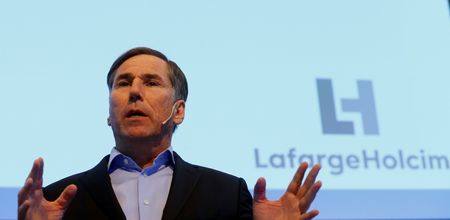ZURICH (Reuters) – Holcim’s North American business is on track to represent half of the cement maker’s sales, CEO Jan Jenisch said in a media interview, with the Swiss company considering more acquisitions to boost its products and solutions business there.
Holcim wants to grow its solutions and products division to around 30% of group sales by 2025, Jenisch told financial website The Market.
The firm confirmed the comments to Reuters.
“We’re well on track there, and it can grow further,” The Market cited Jenisch as saying in an interview published on Wednesday.
“I hope we get one or two more good acquisition opportunities. In a few years, the three equally important pillars of Cement, Aggregates/Concrete, and Solutions & Products should each account for one third of revenues.”
Solutions and Products, which provides products used in waterproofing, roofing and insulation, is already the biggest part of Holcim’s business in the United States, Holcim’s biggest market, Jenisch said.
“In the roofing business alone, we generate over $3 billion in sales there,” he said. “The roofing, facade and mortar systems segments are huge markets.
“The roofing business alone has a market volume of $30 billion in the U.S., and together with Europe and Latin America it’s $50 billion. This market is enormously attractive, allowing good growth and high margins.”
Holcim this week bought a fiberglass matt facility in the United States to bolster it roofing business, as well as 13 sand and aggregate quarries in the Denver, Phoenix and Colorado Springs regions.
The company could also move into facade manufacturing in future via acquisitions, Jenisch said.
Holcim, which has reduced its emerging market exposure from 50% of sales to around 20%, was also not under pressure to sell its Philippines business, where a planned divestment collapsed in 2020.
“At the time, a sale of that business was important because it had a transaction value of $2.1 billion and we needed money to pay down debt,” Jenisch said.
“That pressure no longer exists. In the Philippines, we are the market leader and we are making money.”
(Reporting by John Revill; Editing by Christopher Cushing)

